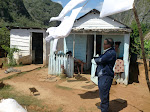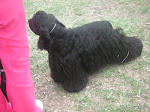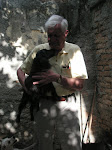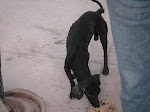VooDoo Killer
In Puerto Rico and some nearby places, a nocturnal predator lurks in the mountains and descends into the nighttime darkness to kill and consume small farm animals like goats, chickens and sheep. Other places near Puerto Rico with reported sightings of this beast include Dominican Republic, Cuba, Bahamas, Florida, and Texas.
This menace is the subject of many drawings and a few photographs, but what pictures exist show scary looking things. Some look like lizards, and others seem more like hairless dogs with very large teeth. A few are flying creatures.
As most of the sightings of this animal have been in Spanish speaking lands, it is not surprising it has attracted a Spanish name. Farmers call it "el chupacabras," a composite Spanish word meaning "sucker" (chupra) of "goats" (cabras) as its victims, often goats, are usually found drained of blood. The name gives rise to the idea the animal is a vampire living on the blood of other animals. Go into a bar in the Dominican Republic, and ask for a chupacabra, and you might get a drink made from tequila and pepper sauce.
If you talk with the campesinos (farmers) in the islands, el chupracabras is not a joke. It is lost income in a place where wealth is more likely measured by the number of animals you own than by the money in your pocket. Any farmer who has come upon a dead goat in one of his pens will testify el chupracabras exists and prowls the farmlands to the detriment of his herds. But you won't find its name in any textbook on animal husbandry or any natural history museum or in any zoo.
So, are we talking about another unicorn or centaur? Is the chupracabra really up there in the mountains or only up there in our imaginations. It's just so easy to dream up an explanation for a loss of valuable property, and humans seem to have a tendency to spread and magnify and mythologize that which we can't otherwise explain, so el chupracabras could be just a figment of many farmers' imaginations.
But then again…
Les Inglis
Friday, February 10, 2012
Subscribe to:
Post Comments (Atom)






























































































No comments:
Post a Comment